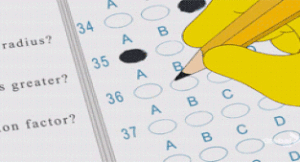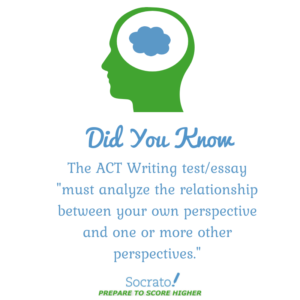Unwritten Test Design Rules Of The ACT Essay (ACT Writing Test)
You’re probably not used to thinking of ACT essay tests as having “rules” the way a multiple choice test would. But, as trained test-takers, we know that every part of a standardised test like the ACT must follow predictable guidelines, or else the results from different days’ tests wouldn’t be comparable to each other, and the test would have no purpose. In this brief section, we’ll learn the Unwritten Test Design Rules Of the ACT Essay.
Before referring to the Unwritten Test Design Rules Of the ACT Essay, register for our demo class now.

ACT Essay Rule 1: Make It To The Third Page

Write at least till the third page as mentioned in the Unwritten Test Design Rules Of The ACT Essay.
The single most important factor affecting the score of your ACT Essay is its length: the longer it is, the higher it can potentially score. If you want to be assured of having the possibility of scoring a perfect 12, I recommend you try to make it to the third page of writing space provided on the test; taking up any more space than that doesn’t seem to have any further impact on your score.
Don’t get me wrong: it’s certainly possible to write a high-scoring essay and not make it onto the third page. But most high-scoring essays will make it to the third page, and pretty much all of them will come very close to that—and you want your essay to be as much like other high-scoring essays as possible. That way, your essay grader can glance at your work, see that it looks like the other high-scoring essays, and feel comfortable giving you a good score if the actual writing is halfway decent. Remember that the grader isn’t going to spend much more than a minute evaluating your essay, and may even spend less time than that.
But this doesn’t mean you can just write two-and-a-half pages of gibberish and expect to get a good score. You still need to articulate a clear position, and support that position with relevant examples and reasoning, as we’ll discuss in this section of this Black Book.
But this length guideline does mean that if you write a short essay (say, a page-and-a-half or shorter) then you have very little chance of getting out of the middle score range, no matter how splendid your writing is.
As we’ve already discussed, the ACT will probably never be up-front with us about the impact of an essay’s length on its score, but we’ll see solid proof that length really is the most important single aspect of your essay in a few pages. So be prepared to write more than two pages in the 30 minutes that the ACT Test provides on the Writing test.
ACT Essay Rule 2: High School-Related Prompts

essay topics most of the times are related to your high-school life
Every ACT Essay prompt will be focused on the everyday lives of high-school students in some way. In many cases, the prompts will ask your opinion of some hypothetical policy that would affect high-school students; for example, the prompt on page 204 of the Red Book asks whether teenagers should be “required to maintain a ‘C’ average in school before receiving a driver’s license.” So you know that the prompt will be directly relevant to your life experience in some way.
Moving forward to the next Unwritten Test Design Rules Of The ACT Essay.
ACT Essay Rule 3: The Grader Doesn’t Care What You Talk About, As Long As It’s Relevant

What you write should be relevant
If we were writing an essay for a particular teacher in school, or for a scholarship or college application, we’d want to consider the personal biases and preferences of the people who were likely to read those essays, because those readers would make decisions about our work based on their personal feelings.
But the people who read the ACT Essay aren’t allowed to punish us for saying something just because they find it boring, or because they disagree with it. The graders of the ACT Essay are only allowed to lower your grade if you use examples and reasoning that aren’t actually relevant to your thesis.
For example, let’s imagine you were trying to support the opinion that high-school students shouldn’t have to maintain a “C” average in order to be allowed to drive, and part of your argument was that many high-school teachers are incompetent and petty, and they might deliberately give a student bad grades to keep him from driving if they didn’t like him. This could be a pretty offensive thing for an ACT Essay-grader to read, because a lot of those graders are high-school teachers themselves, and they know how hard high-school teachers have to work, and how most of them try to do a good job. But the grader wouldn’t be able to punish you for using this in your argument, because it’s directly relevant to the question—the question asked if a person’s grades should affect his driving privileges, and this part of the argument would be discussing where those grades come from and how they might be manipulated.
The reason that graders for the ACT Essay aren’t allowed to consider their personal feelings when grading your essay is the same reason behind most of what the ACT does: standardization. Since different readers will have different feelings about different subjects, ACT, Inc. instructs the readers to ignore their personal feelings and only consider whether an argument is relevant to its thesis.
So we shouldn’t spend any time trying to guess what the essay-grader wants to hear. You aren’t trying to interest your reader, nor do you need to worry about offending her. You just need to pick a position that answers the question in the prompt, and then write an essay with the same key elements that appear in other high-scoring essays, which we’ll continue to talk about in this section.
Again, if your goal is to get a high score on the ACT Writing test, all you need to think about is cranking out an essay that follows the rules we’re talking about here. Don’t waste any time trying to do anything else—it won’t help your score, and it might really hurt your score.
ACT Essay Rule 4: There’s No Set Format (But You Should Probably Use The 6-Paragraph One Anyway)

no format has to be followed
In theory, you can use any type of essay format to write a top-scoring ACT Essay. In my experience, though, the top-scoring essays do tend to have a certain similarity in their structures. They usually include an introductory paragraph and a closing paragraph, and they tend to have around three body paragraphs, each dedicated to an individual reason or example in support of the thesis. When you add in another paragraph dedicated to counter-arguments (as we’ll discuss below), you’re looking at an essay with 6 paragraphs, which is what I generally recommend.
Of course, it’s possible to get a great score without writing exactly 6 paragraphs! The exact number of paragraphs can vary. But if you want to maximize your chances of blending in with the other top-scoring essays, then you’ll want to have paragraphs for an introduction, a conclusion, a consideration of counterarguments, and a few examples or reasons to support your thesis, all of which will almost definitely work out to about 6 paragraphs in total.
In The Real ACT Prep Guide, 3rd Edition, the number of paragraphs in the example essays goes up as the scores go up; the last two essays (with scores of 5 and 6 out of 6) use 6 and 7 paragraphs, respectively.
In a moment, we’ll look at the recommended ACT essay structure in more detail, so you’ll know how and when to vary it if you really want to. Again, though, this 6-paragraph format is generally what I recommend:
· intro paragraph (with thesis statement—see below)
· first example/reason paragraph
· second example/reason paragraph
· third example/reason paragraph
· counterargument paragraph
· conclusion paragraph
While we’re on this topic, you may notice that the Red Book’s descriptions of sample essays occasionally use the word “predictable” to describe them, which may make some readers want to avoid any kind of set essay format. But on page 132 of the Red Book, the analysis specifically says, “no credit is earned or lost specifically for using a familiar writing formula.” Further, the rubric on page 141 of the Red Book says that, for a perfect-scoring essay, “the organization may be somewhat predictable or it may grow from the writer’s purpose.”
But most importantly, we can see in the two highest-scoring example essays from the Red Book that the “predictable” format (an introduction, some sample paragraphs, a paragraph considering counterarguments, and a conclusion) is effective and can get you a 5 or 6 out of 6. These two examples of real-world essays that have been graded by the ACT are the best kind of proof we could ask for.
ACT Essay Rule 5: State Your Thesis Clearly (Preferably In The First Paragraph)

Thesis should stated clearly and directly with no room for ambiguity
After the length of your essay, the second-largest factor affecting your ACT Essay score is the degree to which your reasoning and examples support your thesis. (In a moment, we’ll talk about what the words “reasoning” and “examples” mean on the ACT Essay.)
This means that your thesis needs to be clearly stated in a conspicuous way, so the reader can locate it quickly and easily. After all, if the reader can’t identify your thesis statement, she has no way of knowing whether the rest of your essay supports that thesis statement; if she can’t tell whether the rest of the essay supports your thesis, then she can’t give you a good score. This is probably why most high-scoring ACT Essays contain clear and conspicuous thesis statements.
Most top-scoring ACT Essays place the thesis statement in the first paragraph, often as the very last sentence of that paragraph. That’s sort of the classic position for the thesis statement that’s taught in most high-school English classes, so it makes sense that lots of test-takers are comfortable placing the thesis there, and that most graders are conditioned to expect the thesis to appear there.
Now, in the sample essay from the Red Book that scored a perfect 6, the thesis doesn’t appear until the beginning of the second paragraph. This only reinforces what I’ve been saying about my ACT Essay advice in general: it’s not the only way to get a top score on the essay—it’s just the way I recommend as the most reliable, teachable way to get a high score. The vast majority of top-scoring ACT Essays that I’ve seen have placed the thesis in the first paragraph, so that’s what I recommend. (It’s also worth noting that the only “perfect” ACT Essay in the Red Book still does include a clear thesis, even if it’s not in the most common position, which further reinforces the general value of including a thesis in your ACT Essay.)
Again, it’s possible to get a great score on your essay without stating your thesis in the first paragraph, but your best bet to make yourself clear on test day is still to put it there. That way, your grader is sure to know from the beginning what your stance is.
ACT Essay Rule 6: Your Position Must Be Supported With Reasons Or Examples, But They Can Be Made-Up If You Want, And They Don’t Have To Be Academic

Examples are a must
As we just discussed when we talked about including a thesis, the second-most important factor in your ACT Essay score seems to be how well you support your thesis with examples and reasoning. So each supporting paragraph you write needs to focus on an example or a reason that’s directly relevant to your thesis.
For purposes of this discussion, a “reason” is an abstract principle or concept that supports your thesis. An “example” is a description of a specific instance in which something happened that supports your thesis.
So if we were trying to defend the position that students shouldn’t be required to maintain a “C” average in order to have a driver’s license, the following points would be reasons to support our position:
· A person’s performance in school should have nothing to do with his rights in society.
· Requiring a student to maintain a “C” average to keep a driver’s license would discourage students from attempting more challenging courses.
· Making people maintain a “C” average in order to be able to drive would give students an incentive to cheat in school.
As you can see, the above reasons are basically abstract principles that support our position.
But an example in support of our position would be a description of a concrete instance in which something happened that demonstrated the validity of our position. So statements like the following would be examples if they appeared in an ACT Essay:
· In the novel High School Tragedy, the character Isolde loses her driver’s license when she fails to maintain her grades. As a result, she’s unable to get to her job on time, which causes her to lose it, and creates a financial hardship for her family.
· A recent article on the Huffington Post described a riot at a school that had tried to interfere with students’ driving privileges.
· I have a friend whose parents require him to maintain good grades to keep his driving privileges, and it just makes him more willing to cheat on his assignments so he can make sure he doesn’t lose his privileges.
Don’t worry if you’re not quite sure of the difference between examples and reasons; the important thing is just to understand that ACT Essay graders will accept either kind of support. You can even use a mix of both, if you want: some of your supporting paragraphs can feature abstract reasons, while others rely on concrete examples.
Some people wrongly assume that it’s better to rely on academic examples that draw from history, literature, or science. This might sound like a reasonable assumption to an untrained test-taker, because academic examples would probably impress a real teacher or professor more than non-academic examples would.
But we trained test-takers know the ACT often differs from school assignments, so it shouldn’t really surprise us that academic examples don’t receive any preference on the ACT Writing section. As it turns out, ACT, Inc. doesn’t want to put test-takers who have less academic material to draw from at an unnecessary disadvantage on the ACT Writing test, so it instructs its essay-graders to give equal consideration to academic and non-academic examples: this way, test-takers aren’t penalized simply for being less familiar with certain academic subjects, since the way those subjects are taught can vary greatly from school to school.
It might also surprise an untrained test-taker to learn that the ACT doesn’t care if the examples we cite in our essays are even true.
Standardization is the reason for this quirk of the ACT Essay, just as it’s the reason for so many others. Because the ACT Writing test must apply the same standards to all test-takers, and because it would be impossible to fact-check every single claim in every single essay, the only possible solution for ACT, Inc. is to instruct its graders to ignore whether statements in ACT essays are true or false. So you can make up examples for your ACT Essay if you want—you can even make up the titles of books and other works, as I did above with the book High School Tragedy. You can also be wrong about the details of things that actually did happen—for instance, you wouldn’t be penalized for saying that the American Civil War happened in the 1200s, as long as whatever you were saying about the war was relevant to your thesis.
So let’s summarize all of this stuff about supporting examples and reasons in a few simple sentences:
1. Your ACT Essay needs to include supporting paragraphs that use reasoning and/or examples to back up your thesis statement.
2. If you decide to use examples to support your position, they don’t have to be academic. They only have to be relevant to the thesis.
3. If you decide to use examples to support your position, your examples don’t have to be true.
ACT Essay Rule 7: Address Counterarguments!

state all your counterarguments
We’ve already seen that the most important factor in your ACT Writing score is the length of your essay, and the second-most important factor is how well your examples and/or reasoning support your thesis. The third-most important factor is whether you address possible counterarguments in your essay.
A counterargument is something that somebody might say if she disagrees with your argument. The ACT will penalize us for not discussing possible counterarguments. This requirement of the ACT Essay can be especially challenging for trained test-takers to remember because it isn’t required on a lot of other standardized tests, or in a lot of high-school classrooms.
I find the simplest way to address counterarguments is to dedicate your next-to-last paragraph to the task. One way to do this is to start with something like, “Some critics of my position might point out that . . .” and then list one or two counterarguments in a couple of sentences. Then you can finish the paragraph by addressing those counterarguments in another sentence or two, explaining why you still believe in your original position even though you’re aware of these counterarguments.
If we’re writing an ACT Essay defending the position that students shouldn’t have to maintain a “C” average to keep their licenses, then our counterarguments paragraph might look like this:
Some supporters of a mandatory “C” average for student drivers might say that the requirement would be good for society because it communicates the importance of being a responsible driver. Those supporters might also claim that people who can’t maintain a “C” average can’t be trusted to drive safely. But those people fail to realize that the job of deciding who can drive should belong to the department of motor vehicles, not to schools. If people are worried that student drivers aren’t serious or cautious enough, then they should work to make the driving tests more rigorous, instead of getting schools involved in the process of licensing drivers.
You probably won’t have a difficult time thinking of counterarguments—in fact, when you first read the prompt and you’re deciding how to respond, you might even think of a couple of arguments for either side of the question automatically. If so, you can just save the arguments you thought of for the side you didn’t take, and use them as counterarguments when the time comes.
For further examples and discussion of counterarguments, see my sample ACT Essay later in this section, and my analyses of the exemplar essays from the Red Book.
Next Unwritten Test Design Rules Of The ACT Essay.
ACT Essay Rule 8: A Little Imperfect Grammar Is Okay

a little here and there is okay, but not always!
The high-scoring sample essays in The Real ACT Prep Guide, 3rd Edition, contain a few grammatical mistakes, so we know that an ACT essay can make a perfect score even if its grammar isn’t perfect. That doesn’t mean you should go out of your way to make mistakes, or that you shouldn’t try to use proper grammar. But it does mean that grammar shouldn’t be your main concern when you write your ACT Essay.
Don’t waste time trying to proof your essay thoroughly to catch and fix every grammatical error—just write your ideas down in a clear and direct way. As we’ve discussed, it’s much more important to focus on length, supporting your thesis with relevant examples and/or reasoning, and addressing counterarguments.
ACT Essay Rule 9: Vocabulary Isn’t A Big Deal.

Vocabulary can be normal, but correct.
Untrained test-takers often hope to impress their graders by using big words in their ACT Essays. Please don’t do this on test day. Your ACT Essay graders won’t reward you for using a big word—but they might penalise you if they notice you using words incorrectly, which often happens when test-takers try to incorporate words they’re not actually familiar with.
Do keep this 9 Unwritten Test Design Rules Of The ACT Essay in mind.
When we look at the sample essays from the Red Book, we’ll see that top-scoring essays don’t make any particular effort to incorporate impressive vocabulary words. You shouldn’t, either. Instead, remember to focus on length, matching your examples and/or reasoning to your thesis, and addressing counterarguments. Those are the things that will impact your score on the ACT Essay.
Nevertheless, even after applying all these Unwritten Test Design Rules Of the ACT Essay, visit this link https://blog.prepscholar.com/act-study-plan to build an ACT Study Plan.








Recent Comments